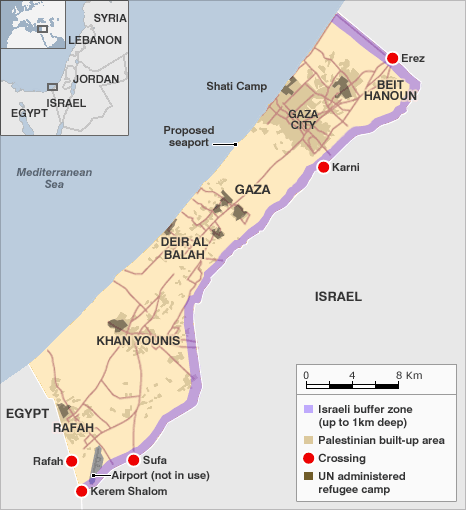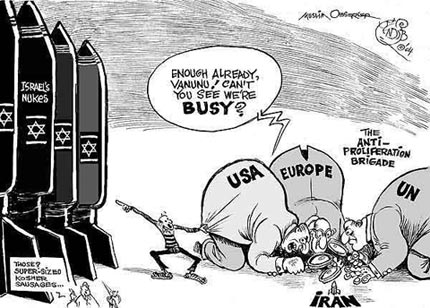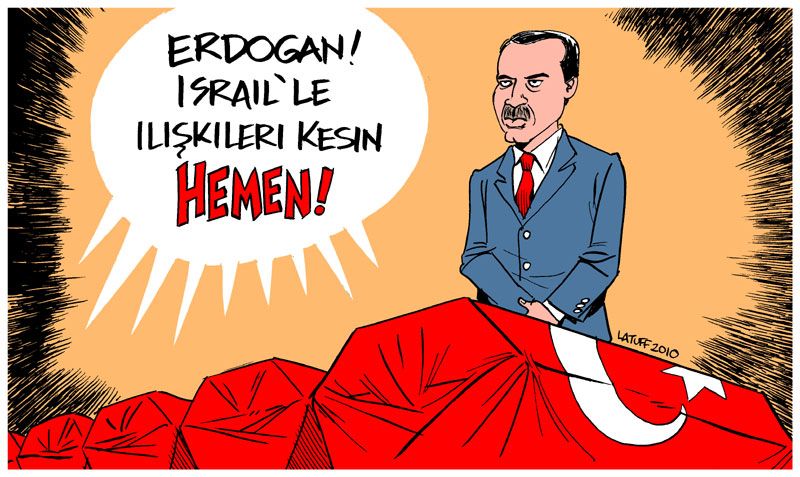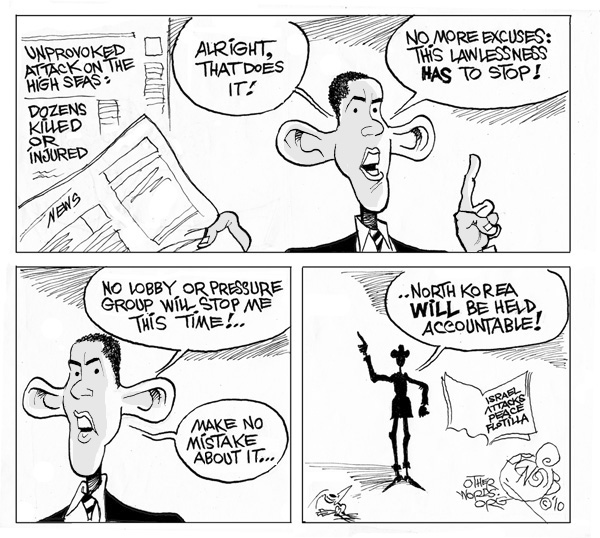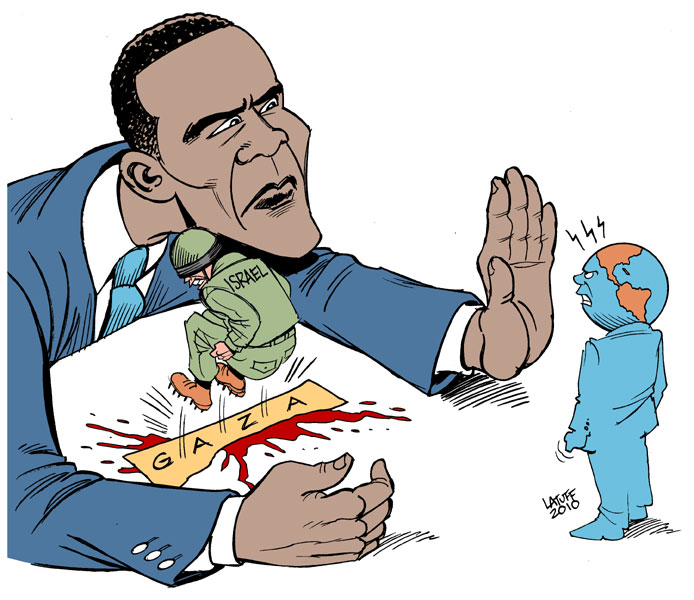EDITOR: Have you heard the latest?
Before it started, the ‘investigation’ has concluded its work. One has to agree with at least one of its conclusion (though not in the way it was meant…): “The soldiers lacked intelligence”… There was no need to get any information from survivors, of course. Again, Israel is speaking mainly to itself, like some demented maniac, looking in the mirror and asking: “are you talking to me?
Israel Navy probe of Gaza flotilla raid finds ‘planning and intel flaws’: Haaretz
Investigation concludes that commando reaction was appropriate as the soldiers did not expect a mass offensive, lacked sufficient intelligence.
The Israel Navy’s internal probe into its deadly commando raid of a humanitarian aid flotilla bound for the Gaza Strip has found serious defects in the planning and intelligence aspects of the operation, Israel Radio reported on Sunday.
The internal Israel Navy probe concluded that the commando unit that embarked on the May 31 raid of the Turkish-flagged Mavi Marmara was inadequately prepared and lacked sufficient intelligence when approaching the activists.
The probe concluded that due to the fact that a mass offensive against Israel’s commando officers was not taken into account, the officers acted accordingly under the circumstances.
“The soldiers wanted to wear their ceremonial uniform, they expected to engage with the passengers in conversation, and that was a defect,” a military official told Israel Radio. “In light of the situation that developed they acted accordingly.”
The soldiers inquired during the investigation into the reason they lacked intelligence information of the fact that the passengers on board the Turkish-flagged aid ship were preparing an attack.
The investigation concluded that the raid on the ship should have only been conducted after hosing the attackers down with water hoses and smoke grenade.
“Operation Sky Winds 7,” the Navy commandos operation to takeover the ship, was carried out according to standard operating procedures established during a ‘mock exercise’ with more than 50 soldiers.
The navy admitted that they were prepared for “resistance like we encounter in Bil’in, but there wasn’t a sense that it would be a walk in the park,” an officer said, adding that there was a general consensus of a need for greater mental preparation of the force before the operation’s execution as not enough emphasis was placed on preparing for every possible contingency.
‘The major defect in the preparations and gathering of intelligence was that we did not know that we would be coping with tens of rioters,” the top military commander involved in the attack told Haaretz.
“This was not disorderly conduct that deteriorated,” he said, “This was a planned terrorist attack.”
Another commander involved in the attack said that “I still awake at three A.M. every morning and ask myself: Damn it, how did we not know more?”
Beit Jala 20 June 2010
Another day of beatings, destruction, burning fields and mayhem by the occupation forces in Beit Jala
Report: Lebanon forbids launch of Gaza-bound flotilla: haaretz
Lebanese sources tell Al-Hayat that flotilla organizers had not filed for the necessary permits, adding that travel to an Israel-controlled port is illegal.
A reported Gaza-bound aid flotilla may not be allowed to depart from Lebanon, Lebanese sources told the Arab daily Al-Hayat on Sunday, saying it was illegal for a vessel leaving a Lebanese port to dock in a port under Israeli occupation.
Earlier Sunday, Haaretz reported that Israel had initiated diplomatic efforts designed to prevent the departure of at least one vessel, carrying 50 to 70 Lebanese women and food aid. Israel has been in touch with the UN, United States, France, Spain and Germany. It has also been speaking with the Vatican because the ship is expected to include several dozen Catholic nuns.
However, according to the Al-Hayat report, it is possible that the flotilla would not be allowed to leave Lebanese shores, as Lebanon forbids a vessel departing one of its ports to reach a port under Israeli occupation. This fact has led Lebanon officials to estimate that organizers would submit a travel plan to a different destination, perhaps Cyprus, only to change course during the course of their voyage.
Sources have also told Al-Hayat that organizers failed to appeal the government for the necessary permits, which include authorizing their departure as well as their travel.
Lebanese officials told the Arab daily that the bureaucratic procedures needed to approve such an endeavor included authorizing the ship’s permit by the Lebanese ministry of transportation, including the approving the intended travelers, as well as the type of cargo the flotilla is to hold.
A senior Lebanese official added that, regardless of the procedures required, Lebanese law did not permit the transport of weapons on board ships.
Lebanon’s Minister of Labor Ghazi Al Aridi told Lebanon’s Al-Nahar that no official “request regarding the flotilla had been submitted,” saying that Lebanon would not “allow anyone to preach us over our support of the Palestinians, but there are rules and they must be followed.”
Al Aridi added that a permit could be given to any port but Gaza, since it was under Israeli occupation.
Earlier Sunday, Israel informed the United Nations and – through diplomatic channels – the Lebanese government that it reserves the right to use all means necessary to stop ships seeking to breach the naval blockade on the Gaza Strip.
In a letter to Secretary-General Ban Ki-moon, Israel warned that the attempt by the organizers to sail from Lebanon and deliver humanitarian aid to Gaza could escalate tensions and affect peace and security in the region.
“Israel reserves its right under international law to use all necessary means to prevent these ships from violating the existing naval blockade imposed on the Gaza Strip,” wrote Israel’s ambassador to the UN, Gabriela Shalev.
Israel security cabinet votes to ease Gaza blockade: Haaretz
Cabinet agreed in principle last week to relax Israel’s four-year land siege, in plan coordinated with Mideast envoy Blair.
Senior cabinet ministerss on Sunday approved steps toward easing Israel’s blockade on the Gaza Strip, days after Jerusalem had issued a non-binding declaration supporting such a move.
The Prime Minister’s Office announced late last week that the security cabinet had agreed in principle to relax Israel’s blockade on the Gaza Strip. However, no binding decision was made during the cabinet meeting.
The ministers held a long discussion on Wednesday afternoon and another onThursday morning on the topic of altering Israel’s policy ,following the three-year siege on the Hamas ruled territory. The siege was imposed after Hamas violently seized control over the Gaza Strip in 2007.
The aim of the discussions was to approve a plan drafted by Prime Minister Benjamin Netanyahu and the envoy of the Quartet of Middle East peace negotiators Tony Blair. The discussions spanned a total of six hours, but no decision was ever made.
During both meetings, many ministers voiced their opinions regarding the blockade, and the defense establishment presented the plans for the “liberalization” of the blockade. However, upon concluding the discussions, the ministers did not vote on any binding practical draft of the decision.
In fact, the policy by which the government is currently bound is the one decided by the security cabinet during the previous term of former prime minister Ehud Olmert, by which the blockade remains as it was.
A senior defense official said Thursday that Israel had “every intention to increase the transfer of goods into Gaza even before the cabinet meeting. We have notified the Palestinians, regardless of the cabinet meeting, that we will allow the entry of food items, house wares, writing implements, mattresses and toys. Beyond that, we have not said a thing.”
Sources at the Prime Minister’s Office admitted that there was no decision, and no vote, during the security cabinet meeting. One of the sources said that “it was a briefing by the prime minister,” and another source said it was a “declaration of intent.”
“A meeting will be held soon, and we hope that a binding decision will be taken then,” the prime minister’s office said, explaining that the reason for the delay is “the need for continued contact with allies within the international community in order to gain support for the liberalization plan.”
This despite the fact that most of the international community has already voiced support for the plan, following a campaign launched by Blair, who drafted the plan with Netanyahu.
The international community has welcomed Israel’s announcement, stating Israel’s intention to ease its land blockade of the Gaza Strip, with the White House saying the announcement was a “step in the right direction.”
Israel’s Palestinian Minority Thrown into a Maelstrom: JkCook
Jonathan Cook, June 16, 2010
Jonathan Cook is a journalist based in Nazareth. He is author of Blood and Religion (2006), Israel and the Clash of Civilizations (2008) and Disappearing Palestine (2008).
The first reports of Israel’s May 31 commando raid on a Gaza-bound aid flotilla surfaced among the country’s 1.4 million Palestinian citizens alongside rumors that Sheikh Ra’id Salah, head of the radical northern wing of the Islamic Movement of Israel, had been shot dead on the lead ship, the Mavi Marmara. Salah is alive, but at the time his demise seemed confirmed when it emerged that large numbers of police had been drafted into northern Israel, where most of the Palestinian minority lives, in expectation of widespread violence.
At the first spontaneous demonstrations in the north, participants expressed shock that Israel had killed international peace activists in international waters — a rumored number of 20 dead later dropped to nine. But in a community used to intermittent bouts of extreme violence from Israel’s security forces, few seemed to doubt that the order might have been given to execute Salah. The sheikh, who has repeatedly been arrested and is facing a series of trials, has long been public enemy number one among Israeli Jews for his campaign to protect the Haram al-Sharif from what he regards as an attempted Israeli takeover. The Haram al-Sharif is a compound of mosques in the Old City of Jerusalem that includes al-Aqsa and is believed by Jews to be built over two ancient Jewish temples. Half-jokingly, a protester in Nazareth wondered aloud whether a military commander had overheard the prime minister, Benjamin Netanyahu, ask: “Who will rid me of this turbulent sheikh?”
Breaking the Siege of Gaza
The flotilla, which was attacked more than 60 miles off Israel’s coast early in the morning, was not the first to bear aid for Gaza, but it was the first to include a delegation of Palestinian leaders from inside Israel. Palestinians are roughly one fifth of Israel’s population. Most of the main Israeli-Palestinian political factions and institutions were included: Salah and his counterpart in the Islamic Movement’s more moderate southern wing, Sheikh Hamad Abu Da‘bas; Muhammad Zaydan, head of the Higher Follow-Up Committee, the umbrella body dominated by local mayors; and Hanin Zu‘bi, a first-term member of the parliament, the Knesset, from the nationalist Tajammu‘ party (Balad in Hebrew). Alongside them was Lubna Masarwa, a resident of Kafr Qara‘ in northern Israel and an activist with the Free Gaza Movement, which organized the aid convoy.
Before they set off, the group of Palestinian-Israelis knew their participation would upset a broad swath of Israeli Jewish opinion. Since 2006, when Hamas won the Palestinian Legislative Council elections, Israel has been progressively tightening a blockade of Gaza to the point that today only a few dozen items are allowed in and less than a quarter of the cargo trucks that once entered the enclave each day are still permitted to do so. The policy has become more severe as its goal has become less clear: Is it to stop “arms smuggling” by Hamas, as Yuval Diskin, the head of the Shinbet, Israel’s secret police, claimed on June 15; or to wage “economic warfare,” as suggested by a recent Israeli document, punishing Gaza’s inhabitants for voting for Hamas; or to act as leverage on Hamas to stop rocket fire on nearby Israeli communities, although such attacks all but ceased long ago; or to force the release of Gilad Shalit, an Israeli soldier held captive by Hamas since 2006? Most Israeli Jews do not seem overly concerned which justification is deployed.
To read the rest, use link above
Give them an inquiry: Haaretz
Rather than investigating Israel’s deadly raid of the Gaza-bound aid flotilla, an international inquiry should look into how Israel managed to sell its destructive Gaza policies to the countries of the world.
By Zvi Bar’el
They want an international commission of inquiry to investigate the events of the raid on the Gaza flotilla? No problem – on condition that it is truly international: the kind that has UN secretaries-general over the years give testimony, as well as U.S. presidents, European leaders, Turkish presidents past and present, and all those who turned their backs when they knew what was going on in the Gaza Strip and agreed to the siege policy until the flotilla. All those who allowed the Israeli-Palestinian conflict to go on undisturbed and who felt that Gaza was a humanitarian, not a political problem.
It is fascinating to read UN resolutions on the Gaza Strip. They are perfectly laid out and usually begin with words like “we call on the sides,” “we regard with gravity,” “we support the Arab initiative,” “we endorse previous UN resolutions,” which were never implemented, of course. Empty words that were wasted on the sentences in which they were used. There was no banging on the table, not a single resolution on dispatching an international force, as if Gaza were not a combat zone but an unavoidable natural disaster; something the aid organizations should handle, not the politicians; a solution with aid convoys, not sanctions.
True, Israel is the one that imposed the siege and jailed 1.5 million civilians in a prison into which it threw food and medicine, following a very orderly list and in line with the number of calories each person needs to survive. Everyone watched, heard and remained silent – the Turkish prime minister and president, who until Operation Cast Lead did not really raise their voices, two American presidents, two UN secretaries-general, and European heads of state. In other words, they spoke endlessly, initiated resolutions, tried to mediate, but in the end raised their hands in surrender. After all, it is an internal Israeli-Palestinian matter that does not really pose a threat to world peace. A million and a half jailed Palestinians? It’s Hamas’ fault, not Israel’s.
Until suddenly it turns out that the Gaza Strip, an empty area without petroleum or diamond wealth, strategically insignificant for the powers, could stir an international crisis. Relations between Israel and Turkey hit a reef, relations between the United States and Turkey are being reevaluated, the Jewish lobby is working overtime in Congress to push the administration to censure Turkey, Germany and the United States are trying to mediate between Israel and Turkey, and Turkish assistance to the international force in Afghanistan is being weighed. Meanwhile, Turkey enjoys great popularity in the Arab and Muslim world, but also threatens the Egyptian and Muslim monopoly for resolving the conflicts in the region. And Israel once more appears to be an irrational burden on U.S. policy in the region.
It also suddenly turns out that when the Gaza Strip manages to stir an international crisis, it is possible to ease the conditions of the siege. The list of items that can be imported is stretched like a rubber band. And people are beginning to talk about conditions for operating the Rafah crossing, the European Union is once more proposing to come back and supervise it, and mostly, Washington has awoken and is flexing a muscle. Not because the people of Gaza have been transformed into something the world is genuinely interested in; they have become a strategic threat. Where were all these critics, all the countries that have signed the UN’s human rights conventions, when the siege was put in place and the blockade became asphyxiating?
An international inquiry into the foolishness of Israel’s policy is unnecessary. There is no need to busy the world with something that is obvious and needs no proof. An international inquiry into the reasons and ways Turkish citizens were killed should also not be created. This is a subject for a joint Turkish-Israeli inquiry that should be set up quickly.
An international inquiry should have a different mandate: to look into how Israel managed to sell its destructive policy to the countries of the world, how they agreed to the jailing of 1.5 million people without a UN resolution. They should look into the international significance of the fact that a member of the UN decides to take such a step, and the international organization that now wants to investigate can’t prevent that step, or forcefully act to cancel it. This is not a commission of inquiry against Israel but against UN headquarters in Manhattan. This is also the reason that such a committee will not be formed. It is much simpler to reach a plea bargain with Israel.
No Gaza optimism over easing blockade: BBC
20 June 2010
BBC News, Gaza City
“I don’t need ketchup or mayonnaise from Israel. I need my business back,” says Nasser al-Helo standing on a busy street in Gaza City.
Mr Helo used to run a business making steel doors in the Gaza Strip. Before the blockade he was able to import metal from Israel and would produce more than 300 doors a month.
“Now, it’s a big zero,” he says. “I’ve lost $300,000 in the past three years.”
Private industry has been devastated by Israel’s blockade, which was tightened in 2007 after the Islamist group Hamas seized control of the coastal territory.
Factories making anything from furniture to textiles, floor tiles to biscuits have gone under.
The Israeli blockade has starved them of the raw materials they need to produce their goods.
Hundreds of thousands of people have lost their jobs. The United Nations estimates unemployment is at 40% in Gaza. Mr Helo used to employ 32 people at his factory. Now there are only four.
‘Not enough’
The overwhelming feeling among Gazans is that Israel’s announcement on Thursday that it is “easing the blockade” is simply not enough.
Continue reading the main story
We are living on a black-market economy
The details of how the blockade will be “liberalised” are still not clear, but reportedly the Israeli authorities will allow more civilian goods to enter, including all food items, toys, stationery, kitchen utensils, mattresses and towels. Construction materials for civilian projects will be allowed in under international supervision.
“Of course it’s not enough,” says Omar Shabban, an economist at the Gaza-based think tank PalThink.
“What about the blockade on people for starters?” he asks.
“One-and-a-half million people are trapped in a prison unable to leave.”
Israel maintains tight control of the border with Gaza, only allowing out a limited number of people to seek medical treatment. Israel says this is needed to protect itself from “terrorist” attacks.
The Rafah crossing into Egypt has also been closed since 2007, although special medical cases are also sporadically allowed to pass through it.
Desperate vendors
Mr Shabban argues that what is really needed in Gaza is not a few more food items – many of which are already available through smuggling tunnels running under the Egyptian border – but a total lifting of the blockade to allow people to work in Israel, as over 100,000 people used to do.
Gaza also used to export many goods to Israel and beyond. Strawberries and flowers are still two of Gaza’s most famous products, but most of them never get beyond the barrier into Israel.
Instead, in strawberry season in January they are sold dirt-cheap off huge wheelbarrows on street corners, the vendors desperate to sell them at any price before they rot.
Israel has argued that the blockade is necessary to put pressure on Hamas.
The group came out top in the Palestinian parliamentary elections in 2006, but the EU, the US and Israel refused to recognise Hamas in government unless it renounced violence and its commitment to destroy Israel.
Then in June 2007, Hamas ousted its secular rival, Fatah, and the Fatah-dominated Palestinian Authority security forces from Gaza.
Rockets
Over the past decade, Hamas has fired thousands of rockets into Israel, killing more than 20 Israelis.
When in season, strawberries are available at rock-bottom prices
But since Israel’s major offensive on Gaza in 2009, which devastated the territory and left more than 1,400 Palestinians and 13 Israelis dead, the number has dropped dramatically. One person – a Thai farm worker – has been killed in southern Israel by a rocket fired from Gaza in the past 12 months.
Hamas has tried to rein in rocket fire, but it does not control all the militant groups in Gaza and sporadic, usually ineffective rocket fire continues.
Israel says it is the responsibility of the Hamas authorities to stop all rocket attacks, and that the blockade is necessary to stop weapons being brought into Gaza.
But at least until now the list of items banned from entering Gaza has gone far beyond weapons. Coriander, chocolate and children’s toys have famously been excluded.
Low expectations
In actual fact, such things are readily available in the supermarkets in Gaza.
Millions of dollars worth of goods are smuggled in through tunnels from Egypt.
Most goods are smuggled in through tunnels from Egypt
There is food on the shelves and in the markets but the blockade means it is too expensive for most people to afford. A kilo of beef smuggled from Egypt costs around $15, more than most Gazans earn in a day.
“We are living on a black-market economy,” says Mr Shabban.
Gazans have little faith in Israel’s announcement. At best, they will wait and see if anything changes in the coming weeks and months.
Indeed, like most places in the world, people here are more preoccupied with the World Cup. The cafes of Gaza City on Friday were full of people cheering on Algeria as they thrashed out a dire draw with England.
The beaches in Gaza are packed this weekend with thousand of children enjoying summer camps and frolicking in the Mediterranean Sea.
But as they play in the water, a reminder that the blockade of Gaza is still very much in place – the sound of machine-gun fire just a few kilometres off the coast.
Israeli navy ships, which continue to occupy and control Gaza’s territorial water, regularly open fire on Palestinian fishing boats that stray beyond the limits of where Israel allows them to fish.
Yet most of the children did not even bat an eyelid at the gunfire.
The blockade here has been come a way of life. Few people are optimistic that will change.
KEY ENTRY POINTS INTO GAZA
• Rafah – under Egyptian control. Since flotilla deaths, opened indefinitely for people only. Has been closed for the vast majority of the time over the last three years. Makeshift tunnels in this area used to smuggle in goods, including weapons
• Erez – under Israeli control. Crossing for pedestrians and cargo. Access restricted to Palestinians under the jurisdiction of the Palestinian Authority and to Egyptians or international aid officials
• Karni – main crossing point for commercial goods
• Sufa – official crossing point for construction materials
• Kerem Shalom – for commercial and humanitarian goods. These last three crossings have been frequently closed by Israeli army since Hamas took control of Gaza in 2007
• Opening of seaport and bus routes to West Bank had been agreed in 2005 but plans since shelved
• Airport – bombed by Israel in early years of the 2000 Intifada
• ‘Buffer zone’ inside Gaza where it borders Israel. Gazan farmers forbidden to enter the zone
The patriot: Haaretz
What does the Israeli patriot want? What state exactly does he dream of before falling asleep at night? What society does he hope for while immersed in his morning routine?
By Gideon Levy
What does the Israeli patriot want? What state exactly does he dream of before falling asleep at night? What society does he hope for while immersed in his morning routine? Incitement, slander and boycott campaigns have recently been launched here against Turkey, Sweden, the High Court of Justice, B’Tselem, the New Israel Fund, the media, Richard Goldstone, Noam Chomsky, Elvis Costello, the Pixies, Ahmed Tibi, Hanin Zuabi, Tali Fahima, Barack Obama, Anat Kamm and the rest of the world, and also a bit against yours truly. A hypocritical, fallacious and depressing worldview emerges from these campaigns.
No, he is not a villain, the Israeli patriot – he is merely brainwashed and blind.
He would like to live in a democracy – of course he wants democracy; after all, he was taught in school that it is a good thing, and he boasts to the world that Israel is “the only democracy in the Middle East.” But it’s a democracy without most of its mechanisms. He is satisfied with elections and majority rule: The majority will make the decisions, and to hell with the minority.
The Israeli patriot wants to open a newspaper and turn on the television and see what’s going on in the world – but only a world in which everything is good. Well, if not the entire world, then at least Israel, as long as it’s all good. He wants to take in lots of World Cup soccer, entertainment programs, loads of gossip, and most importantly – only good news. He wants only commentators who “smash” the Arabs and “bash” the left-wingers and other Israel haters, and who call for strikes on Gaza, Hezbollah, Iran and Istanbul again and again.
He is a man of peace, the patriot, but he also wants a war once every two to three years and he wants the media to say so, too. He doesn’t really want to know what happened during Operation Cast Lead, or what the world – which hates us – thinks of us and why. He doesn’t want to know what is going on in the territories or among the poor, screwed, underprivileged people.
But wonder of wonders, if he feels deprived, where does he run? To the newspapers and the TV, which he loves to hate. He also loves to hate those left-wingers from the High Court of Justice, but the moment he’s in any kind of trouble, where does he turn? To the court, of course.
The Israeli patriot wants the world to love us unconditionally and without limits. Yet at the same time, he wants to ignore the whole world and spit contemptuously on its institutions, conventions and laws. He wants a package deal with Turkey, all-inclusive, but not including listening to what the Turks have to say. He wants to spread white phosphorus in Gaza and have the world recite, like himself, that it’s white rain. He wants the United Nations to impose sanctions on Iran, but to disregard its own resolutions related to Israel. He wants a half-Iranian regime here, but portrayed as liberal in all the tourist guidebooks.
The world according to the Israeli patriot consists, in fact, only of the United States – but even then only to a certain extent. Obama’s America is also starting to get suspicious. The patriot wants America to foot the bill and shut up. He wants the Jewish world to contribute money, to embrace us, to come here in masses with the Taglit-Birthright program. But if J Street, JCall, Goldstone or Chomsky arise from among the Jews, he will hasten to brand them anti-Semites. They’re either with us or against us – even the Jews.
He wants a Knesset that represents the people, meaning his kind of people – without Ahmed Tibi and Hanin Zuabi, preferably without any Arabs at all, and if we must then only Ayoob Kara. Let them travel overseas to stretch out on tzadiks’ graves, but only in Jewish communities, not in Libya. Let them fight to free abducted soldier Gilad Shalit, but not the myriad prisoners of their own people.
Shalit? The Israeli patriot wants his release, as all Israelis do, but not, under any circumstances, in exchange for freeing terrorists. He also wants NGOs around and donations coming in from abroad, but only to synagogues and hospitals. And above all, he wants to protect Israeli soldiers and their commanders, unconditionally. They must remain immune from any criticism. They killed two women waving a white flag in Gaza? They shot a Jerusalem driver at close range? They killed – perhaps unnecessarily – Turks on a flotilla? Anyone who mentions such things is a traitor.
This is the patriot’s impossible country. It is doubtful whether even he actually enjoys living in it. So when will he criticize his beloved country? In the never-ending traffic jam, in the endless queue, and of course, when the IDF isn’t killing enough. Any other criticism? No thank you, I’m a patriot.
Israel reacts to German minister: Ban on politicians entering Gaza is necessary: Haaretz
German development minister said Israel has made a ‘large foreign policy mistake’ by barring him from visiting the Gaza Strip.
Israel reacted with surprise Sunday to criticism by German Development Minister Dirk Niebel, who said Israel had made a “large foreign policy mistake” by not allowing him to visit the Gaza Strip.
“There is a clear policy,” an Israeli Foreign Ministry official said. “We have explained that we do not allow the entry of foreign politicians to the Gaza Strip.”
The official, who spoke on condition of anonymity, told the German Press Agency dpa that Israel feared the Islamist Hamas movement, which administers the coastal salient, would exploit visits by foreign politicians for propaganda purposes. This would also weaken the moderate, West Bank-based government of Palestinian President Mahmoud Abbas, he said.
He added that Israel had no problem with visits to the enclave by foreign experts and officials who wish to observe development projects, or by representatives from multi-lateral organizations, such as the United Nations.
Niebel had planned Saturday to visit a sewage plant financed by German development aid. He said Israel’s blockade of the Gaza Strip was “not a sign of strength, but evidence of unspoken fear.”
German Foreign Minister Guido Westerwelle added his criticism of Israel’s stance on Sunday.
“I regret the decision by the Israeli government to deny minister Niebel entry to the Gaza Strip,” Westerwelle said in a statement, in which he also called on Israel to completely drop its blockade of the Gaza Strip.
Western countries have placed a diplomatic and political embargo on Hamas, after the organization, which won the 2006 Palestinian legislative elections, refused to change its charter to recognize Israel, renounce violence, and honor previous Israeli-Palestinian
agreements.
Israel imposed its blockade on the Gaza Strip in June 2006, after militants staged a cross-border raid and snatched an Israeli soldier, Gilad Shalit, who is still being held in the salient as negotiations for his release have so far come to naught.
The Israeli siege was tightened in June 2007, when Hamas militants seized control of the Strip’s security installations, after routing officials loyal to Abbas and to the Palestinian Authority.
Israeli President Shimon Peres said Sunday that Israel would end the siege if Hamas ended attacks against Israel and released Shalit.
From a Prisoner of Conscience in an Israeli Prison: Jewishpeacenews
The letter below, from human rights defender, Ameer Makhoul, was released and distributed today by Makhoul’s family and friends. It was written on May 30th, after Makhoul had spent 3 weeks in prison without access to even pen and paper, not to speak of lawyers, family visits, due process, humane and legal conditions. It made it’s way to his home by snailmail and then the original Arabic was translated into English.
Like many other citizens of Israel—both Jewish and Palestinian—who have held repeated protests against Makhoul’s imprisonment as well as that of Omar Said, I believe that that “Makhoul is being detained and severely harassed for exercising his right, under Israel’s Basic Laws, to free speech and political expression,” as pseudonymous publicist “Moshe Yaroni” put it (see previous JPN posting on the topic at: http://jewishpeacenews.blogspot.com/2010/05/is-israeli-democracy-losing-ground.html). Amnesty International has called on Israeli authorities to stop Makhoul’s mistreatment (see: http://www.amnesty.org/en/news-and-updates/israel-must-stop-harassment-human-rights-defender-2010-05-12).
As a long time activist, here in Israel, I am both dismayed and determined these days; Dismayed at how the state I share in proceeds, with great speed, to discard remaining vestiges of democratic governance. Determined to continue resisting this process with all the means at the disposal of activists and civil society.
For comprehensive information on the interrogation and almost definite torture of Makhoul and Said as well as contact information for taking action, see: http://freeameermakhoul.blogspot.com/. I hope that each of you will spread the information further and take action in other ways.
Rela Mazali
——————————————————————————
May 30, 2010
Letter from Gilboa Prison, Ameer Makhoul
After being allowed to get a pen and a piece of paper, which has been banned for the last three weeks, and after being allowed to get out of my total isolation, it’s a moment to write a short letter from my jail (Gilboa).
It’s a great opportunity for me to express my sincere thanks, greetings & appreciation to all the colleagues, friends and solidarity groups, organizations & persons, internationals, Arabs in the region, Israelis & Palestinians in the homeland & in the Diaspora. A very special salute to all those who visited my family and supported them after the trauma they passed in May 6 & since that late night.
It’s a moment to express my great appreciation to all the international & local human rights organizations which raised their voices loudly.
Also to Ittijah partner organizations all around the world which supported my/our struggle for justice and for a fair trial in order to get to prove my innocence.
Physically I am still suffering very much but morally it’s a great feeling to know what solidarity means.
My story is that the Israeli intelligence, “the shabak”, assumed something without knowing & without any evidence. I was requested and forced to explain to them in a very detailed way how exactly I did what I didn’t do, ever. In case of any logical problem for them to complete the puzzle, they have the legal tools to fill it in by so-called secret evidence, which my lawyers and I have no legal right to know about.
According to the media in Israel, I’m already guilty, a terrorist & a supporter terror. The rule of the game here is that I’m guilty whether or not I prove that I’m not. This collective assumption is prior to court & trial procedures.
The abuse of evidence & fair legal procedures are crucial. The Shabak can tell lies to the court by so called “secret evidence”, “banning meetings with lawyers”, “banning the publication of information,” “imposing total isolation” & other very sophisticated ways of torture, which leave no direct evidence although it is very harsh. (See Adalah: www.adalah.org). I believe that my case is an opportunity to examine these tools as tools for the criminalization of human rights defenders.
I would like to highlight again your support & solidarity. I look to it as a very essential & crucial message of support the victim and to stop the oppressor. Thank you. Let us continue with the way for justice, human dignity, human rights and ensuring an opportunity for a fair trial.
Sincerely,
Ameer Makhoul
How I was summoned to the Knesset: Kibush
by Ram Cohen
Ynet Hebrew, June 18 2010
http://www.mynet.co.il/articles/0,7340,L-3907144,00.html
Translation Adam Keller
On Monday, June 21, I am to appear before the Knesset Education Committee and the Minister of Education, Mr. Gideon Saar, following my unequivocal words to my students, condemning the 43 year-old occupation and rule over the life of the Palestinian people.
A school principal should have a clear and unequivocal moral position about any subject and issue on the agenda of Israeli society. A principal is not an educational clerk. A principal must have, for example, something to say about the deportation of the children of migrant workers, trafficking in women, the separation fence, the withdrawal from Gaza, minimum wage law, settlers attacking Palestinian villagers to exact a `price tag`, the removal of Arabs from their homes in Sheikh Jarrah, the siege on Gaza, corruption in government, or the relations of religion and state.
It is the duty of a school principal to take a stand and to defend it if necessary. A principal can not rest content with nodding and mumbling when students ask questions about the conflicts in Israeli society. The one who gives evasive answers is a hollow person, not worthy of being called an educator. Being an educator means to uphold a set of universal and national values which deserve to be part of the state`s symbols.
Being at the storm center of controversy, I was recently obliged to introduce for discussion at our school a spectrum of opinion for and against our presence in the Occupied Territories, and I must admit that this was very difficult for me. When I believe that our country does not respect International Law and its own laws, nor does it have proper regard for human rights – I frankly find it hard to admit into the school representatives of views which support the status quo. Since the expulsion from Paradise it is our duty to distinguish right from wrong. It is my duty to point out the wrong, and to strongly condemn it.
Those who demand that I prepare students for recruitment should know that my duty is also to tell them that they would enter a territory which was occupied 43 years ago, in which human rights are being shamefully violated on a daily basis by means of our military superiority. In future, these children will have to account for themselves, and they will ask if their school has revealed to them the terrible secret called occupation. Yes, occupation. An occupation, not a liberation, not a return to an ancestral land. Not even a return to dry water holes which have been re-filled with tears. *
In the school which I run, there is no entry to proponents of the racist Kahane ideology. There is no place for people who advocate the use of drugs for relieving stress, nor to rabbis who argue that discrimination of Sephardi girls is justified due to the internal codes of their religious community, to those who promote a multiculturalism which includes female genital mutilation – and to those who justify the discrimination against Arab residents of this country or the `encouraging` of them to emigrate.
Wherever there is a conflict, any decision will be a political decision. When I decided seven years that this school would teach Arabic rather than French, that was a political decision. The same when I decided that school hikes will not include the `City of David` settlers.**
On the other hand, also school principals who let their students go to a protest against the withdrawal from Gaza and who present it as the deportation of Jews from their land are performing a political act. To talk to students about a holy duty of settling Jews from the sea to the Jordan River, on the basis of a Divine promise, is a political act. Expressing opposition or support to the release of hundreds of Palestinian prisoners in exchange for Gilead Shalit – what is that if not taking a political stand?
So what are the limits of freedom of expression at school? My answer is: everything is permitted provided that it does not contradict such basic values as democracy, universalism and humanism, as well as observing the laws of the State of Israel which should conform to the norms of the Family of Nations.
I can not end this statement without noting that this Knesset debate would probably not have taken place had Professor Yuli Tamir still been Minister of Education and Haim Oron Still headed the Education Committee***. The obvious conclusion is that free speech in the schools is not determined solely by the innocuous expedient of `examining the boundaries`. Rather, it varies according to the political perceptions of those who at the moment occupy the top positions in the educational system, the Knesset and the government.
Ram Cohen is an educator and principal of the Aleph High School in Tel Aviv.
* This is a reference to the song `Jerusalem of Gold`, embodying the nationalist euphoria of 1967, which includes the words `We have come back to the waterholes`.
** The settlers group known as `Elad` have established themselves at Silwan Village, directly south of the Old City of Jerusalem, where they claim King David had his palace 3000 years ago, with the proclaimed aim of `Judaising` it. They have expelled Palestinian residents from several homes and took them over, and the `archeological` diggings conducted by settlers undermine the foundations of many other houses. The `National Park` maintained by the settlers is recommended by the Ministry of Education as a venue for school hikes.
*** Yuli Tamir and Haim Oron, of respectively the Labor Party and the Left-Zionist Meretz Party, held the positions mentioned until the accession of Binyamin Netanyahu to power.
Mad Israelis section
This section is devoted to the many unhinged in Israel whose voice should be heard…. to separate its contributors from others, less nutty correspondents, their names have been coloured red.
EDITOR: The world is upside down
Against all that we have been told, it is the Palestinians who have occupied the territories and are building settlements, not the Israelis…You live and learn. How come we got it wrong for so long? That we did not know that the victims of apartheid are the Israeli Jews? Well, at least we know now.
Anti-Jewish apartheid: YNet
While Jews can’t build in West Bank, Palestinians constructing new city
Yoaz Hendel, 06.13.10
A total of 4,000 housing units at the heart of Samaria, bulldozers working day and night, construction companies and contractors gaining profits, Palestinian laborers and Jewish architects, and warm support from Obama, Qatar’s government, and Tel Aviv too – this is no dream, ladies and gentleman; this is the city of Rawabi, a Palestinian vision that is turning into reality.
Here, there are no construction freezes, no crises vis-à-vis the White House, and no enraged op-eds by people who usually enjoy making dire predictions in respect to the construction of homes in occupied areas.
Among the parties involved in this enterprise we find businesspeople, Palestinian leaders Abbas and Fayyad, officials in Washington, and of course us Israelis, who for years now had been longing for some settlement activity without provoking the world’s wrath. And so, even the Jewish National Fund (JNF), an organization whose officially declared goal is to “salvage Eretz Israel land for the benefit of the Jews” ends up planting tree in the territories, but not for the benefit of Jews, but rather in support of the Palestinian vision.
I am not envious of the new Palestinian town, or the $700 million being invested there, or of the replacement of empty hills with modern homes. I’m not even jealous of their vision vis-à-vis our vacuum. People, whether Palestinian or Jewish, need homes, communities, and cities, regardless of which ethnic group or religion they belong to.
Used to being guilty
Yet I am bothered when I see the attitude of the very same people who support Rawabi and its residents to their future neighbors, those natives who the world refers to as settlers. While monitoring the construction of balconies in the settlements has turned into a noble sport among Europeans and on the White House lawns, the members of other religions are allowed and encouraged to build in the area.
We got used to the world referring to the war against Palestinian terrorism as apartheid, we got so used to being guilty, to the point of failing to notice that the construction apartheid is happening to be directed against us. The Arabs are allowed to buy homes anywhere, while the Jews are not. The Arabs are allowed to build, expand, and engage in family-reunification. The Jews are forbidden.
What we have here is not an American attempt to decipher the depth of Israel’s willingness to compromise, as nobody over there no longer believes in a solution. All we have here are the narrow interests of a different Administration, issues of image vis-à-vis the Arab world, and the desire of a president who is indifferent to Israel to reject the Jewish settlement enterprise (at this time, in Judea, Samaria, and in Jerusalem, and if necessary, tomorrow it will expand to the Galilee and Negev.)
Indeed, in this game, there is no room for the JNF and the other remnants of Zionism
EDITOR: Another honorary Israeli…
While Julie Burchill is not Israeli, she admits she is Gaga on Israel. In a piece which should get the Melanie Phillips Hold Me Down award, she proves to be worthy of the title of Honorary Israeli.
How the British media get their kicks: Jerusalem Post
By JULIE BURCHILL
06/18/2010
In Britain, tabloids get excited about roistering royals, fickle footballers and sex maniac MPs. But broadsheet papers only really get excited about Israel.
Over here in Britain, the tabloid newspapers get excited about roistering royals, fickle footballers, priapic pop stars and sex maniac MPs, among other things. They get excited about celebrity love-rats, three-in-a-bed romps and cocaine hells. They’re pretty excitable all round, bless ’em! But some of the broadsheet newspapers only really get excited – really excited, parasexual excited – about one thing: Israel behaving badly!
Of course, one hack’s bad is another hack’s baaad, and of course my first reaction was, “Ooo, which part of ‘don’t mess with Israel’ don’t these bed-wetters understand?”
On the phone later with my equally philo-Semitic gentile friend, she predicted that “if there’s any English on board, one of them will have a hyphen. You wait and see!”
I must point out here that unlike the situ in your gorgeous country, having a hyphenated name here doesn’t mean you’re the proud son of someone, i.e. Ben-Whoever. Rather, it means that you’re an upper-class, peasant-exploiting, in-bred half-wit.
In some extreme cases of overcompensation for what is clearly lacking in other departments, a mere double-barrelled name is considered too, too common, and families will add yet another hyphen – hence the Cave-Browne-Cave (sounds like code for a a pervy sex act) and Vane-Tempest-Stewart (one of the daughters, Annabel, left her husband for a Jew – an exception to the half-witted rule). And imagine how tragic your sense of your own worth must be to actually bother with four surnames (Plunkett-Ernle-Erle-Drax) or even five (Temple-Nugent-Brydges-Chandos-Greville – you’d have nodded off by the time the introductions were done). For some reason (and while not implicating any of the above named), the spawn of the ruling class is often drawn to anti-Israel activity.
IF YOU read Agatha Christie’s stories from before she realized she shouldn’t call people names any more (pre-1950s, or maybe the year when her publishers decided that the next printing of Ten Little Niggers should instead be called And Then There Were None would be the watermark), you’ll find loads of dodgy stuff. There’s “men of Hebraic extraction, sallow men with hooked noses, wearing flamboyant jewelry.”
There’s “the long-nosed Mr. Lazarus,” of whom somebody says, “He’s a Jew, of course, but a frightfully decent one.” And Christie was a smart toff!
Jews are very clever and the English ruling class are very stupid, so naturally English Jews have taken from the poshos a bit of the wealth and property that once was theirs, snatched from the peasantry and bequeathed by robber barons long ago. Nowadays their thick, unemployable children can find an outlet for their inborn anti-Semitism in pro-Palestinian protest. And sure enough I turned on the TV the day after the flotilla was floored, and there was a man called Lort-Phillips, bewailing the plight of his sister, one Alexandra Lort-Phillips, late of the ship of fools, who was now hopefully getting what she deserved in Eretz Yisrael.
A few days later a piece turned up on the society page of the Daily Mail explaining that Lort-Phillips is the great-niece of Dame Frances Campbell-Preston, a woman of the bedchamber (not as fun as it sounds) and friend of the late queen mother of England, who inexplicably claimed, “I am very proud of her. She is standing up for her principles.”
Wow, from royalty-flunky to Hamas-groupie in two generations – that’s the spirit that made this country great! At least, though, the old broad has the excuse of being 91 years old to spout such twaddle. What’s everyone else’s excuse?
It was poor Mark Regev, your charming spokesman, who took most of the flak. On BBC’s Newsnight, the female presenter allowed the love boat cheerleader enough time and space to practically make the Gettsysburg Address on behalf of these savage clowns (they came off like a pair of those weird women who write offering marriage to serial killers, to be frank) before subjecting Regev to such a relentless interrogation that he had to plead to be allowed to make his point.
Over on Channel 4, Jon Snow (a respected journalist but rather strange man, who several years ago refused to wear a red paper poppy – the British symbol of respect for fallen soldiers – in the week approaching Remembrance Day on the grounds that doing so was “poppy fascism”) took up the war of words against Regev, becoming as overheated as a teenage fan of Justin Bieber on coming face-to-face with a supporter of Miley Cyrus, claiming that – ahem – the Turkish president might be about to order warships to accompany Turkish aid vessels headed for Israel.
“What are you gonna do, what are you going to do, eh? What are you going to do if Turkish warships show up?” Snow railed, basically doing a Chris Morris “it’s war!” routine which had Regev incredulous. Cut to the end of the show, when Snow had to make a grovelling apology. The Turks had obviously been on the blower; the president never ordered any warships. And Snow had used a heated exchange to provoke and promote some very dangerous propaganda.
Not once did I hear a British interviewer ask any of the so-called secular radicals participating in the flotilla why they are allied with Islamic supremacists who subjugate women, persecute gays, oppress non-Islamic minorities and seek to impose Islam globally. But Sarah Montague on Radio 4 was a breath of fresh air in her interview with a Gaza-groupie:
Sarah Montague: Are you saying that Israeli soldiers who boarded that ship opened fire and there was no provocation for it?
Sarah Colborne: That’s what I am saying, yes.
SM: You saw that. You saw them fire when there was no attack on them?
SC: I saw them, well, I saw them, what I saw was them coming down from a helicopter onto the roof, I saw them trying to board the boat via dinghies.
SM: Were they attacked by those on board?
SC: They – the people on board, as you can see, were trying to stop…
SM: Hitting them with metal bars…
A JEWISH lawyer I know, as level-headed and laid-back a man as you could find, told me that he has never seen the British Jewish community as frightened as it is now. With the honorable exception of people such as Miss Montague and the brilliant Brendan O’Neill on spiked.com (who doesn’t even support the State of Israel, but writes with sparkling contempt of the reason he despises the Gaza-groupies), the British media must take some responsibility for creating this climate of fear. When British Jewish children are beaten up on school buses, as has happened increasingly over the past few years, I hope they feel proud of themselves and their mission to inform and enlighten.
The writer has been a journalist since the age of 17 and an admirer of Israel since the age of 12. The television adaptation of her teenage novel Sugar Rush won an International Emmy in 2006.
EDITOR: And another honorary Israeli…
Melnie Phillips is not a stranger to our readers, one hopes… She has been the Shining Light of the Loony Right for a long time, and a supporter of Israel as long as one wishes to go back, whatever Israel might do. Her antipodean logic is on record.
The spread of flotilla sickness: Jewish Chronicle
The reaction to Israel exercising its legal right is but the latest example of the West’s willingness to wallow in lies and hypocrisy
By Melanie Phillips, June 10, 2010
The flotilla episode provided the trigger for a frenzied demonstration of the world’s collective loss of mind over Israel.
Israel did what it was entitled to do and what any other country at war would do: intercept boats that might be carrying weapons for an aggressor regime. Since six out of the seven intercepted boats then proceeded peacefully to Ashdod where their cargo was checked, this was demonstrably not an Israeli “attack”.
Conversely, as everyone could see from the video evidence, on the main boat the attack took place against the Israelis – who then killed nine of their jihadi assailants solely to protect themselves from being lynched, kidnapped and murdered.
Yet, for this, Israel has been hysterically denounced across the world for an act of aggression and even piracy – an onslaught, in effect, upon Israel’s right to defend itself, without which no country can exist.
How is it possible that so many – Jews included – believe all these lies?
The claim that Gaza is starving is the opposite of the truth: its markets are stacked with produce, and every week Israel allows in thousands of tons of aid across the border. As its organiser admitted, the flotilla was not about humanitarian aid at all but was designed to break the sea blockade – and thus open up a weapons channel for Hamas. This manipulative and mendacious exercise was but the latest attempt to weaken Israel ready for the slaughter through an ever tightening noose of lies, demonisation and delegitimisation.
We have endured the fabricated claims of Israeli massacres in Jenin, the 2006 Lebanon war and Cast Lead; the charge that Israel is an “apartheid” state, that it has committed genocide, ethnic cleansing and is starving the people of Gaza; that it is the aggressor in the Middle East.
How is it possible that so many believe all these lies? How can so many Jews believe them? As I have described in my new book, The World Turned Upside Down (please forgive the commercial) the witch-hunt against Israel is the pivotal example of the West’s repudiation of reason itself, leading to a widespread inversion of truth and lies, justice and injustice, right and wrong.
The “progressive” left-wing intelligentsia now subscribes to a world-view that, over a wide range of issues, subordinates truth to ideology. This manifests itself in utopian creeds that hold that the world would attain a state of perfection if only it wasn’t for capitalism/America/ industrialisation/men/the nation state/those damned Jews.
Since these creeds are axiomatically the embodiment of virtue, all who dissent must be treated as moral outcasts and their views stifled. From this Manichean mindset, which decrees that all who are not the left are a) the right, and b) intrinsically evil, it follows that anyone who challenges the lies generated by ideological dogma is by definition right-wing and evil. As a result of this knee-jerk name-calling, people dismiss such inconvenient truths even when they stare them in the face.
This terrifying mindset is the left’s default position. That is why this madness towards Israel is not confined to gentiles. Indeed, even Jews who consider themselves to have the interests of Israel at heart sometimes tragically end up believing the lies and supporting positions that would destroy it.
Which partly explains why some communal leaders busily suck up to the enemies of Israel in the faith or political worlds, even telling them on occasion that “in private I agree with you”.
So we find ourselves in this nightmare situation. The Great Flotilla Derangement has created the impression that, as Iran moves towards completing its genocide bomb, the rest of the world senses an endgame and is moving in on Israel for the kill.
